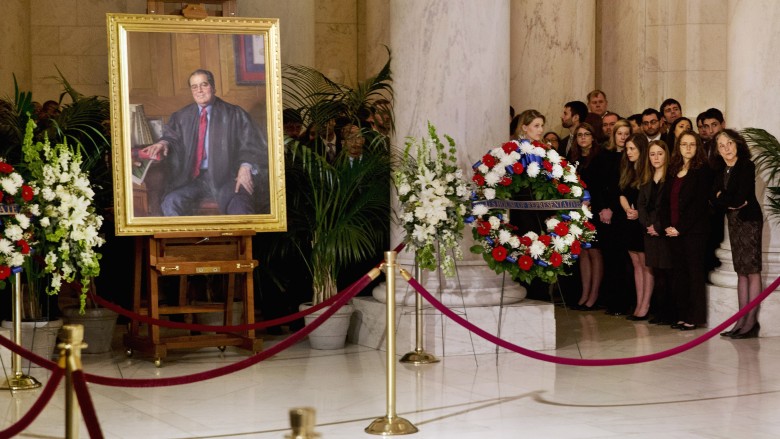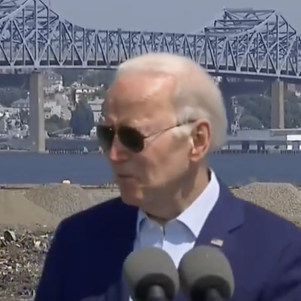Obama sets out to pick a Supreme Court nominee
By Associated Press | February 19, 2016, 19:12 EST
 Law clerks and staff watch a private ceremony in the Great Hall of the Supreme Court where late Justice Antonin Scalia lies in repose in Washington Friday. (AP Photo/Jacquelyn Martin, Pool)
Law clerks and staff watch a private ceremony in the Great Hall of the Supreme Court where late Justice Antonin Scalia lies in repose in Washington Friday. (AP Photo/Jacquelyn Martin, Pool) WASHINGTON (AP) — It may seem like Mission Impossible.
Still, President Barack Obama this week set out on a quest to put his third justice on the Supreme Court, hoping to overcome solid Republican opposition and difficult election-year politics in what likely will be the last major battle of his tenure.
Obama faces a Republican leadership that appears united in opposing his decision to fill the seat as well as a crop of Republicans facing re-election who have lined up behind their leaders.
Those vulnerable GOP senators are crucial to any White House strategy for filling the seat held by the late conservative Justice Antonin Scalia. Democrats would need 14 defections from GOP ranks to break a filibuster and confirm a nominee. So far, no GOP senator has indicated he or she is ready to vote for an Obama nominee.
The White House said Friday that Obama will move ahead. Obama on Thursday called key Senate leaders, including Majority Leader Mitch McConnell, R-Ky., and Judiciary Committee Chairman Charles Grassley, R-Iowa, part of the customary consultation once considered essential to laying the groundwork for a warm reception for an eventual nominee.
But the president did not appear to make much headway with the GOP leaders. Hours after the call, an op-ed penned by McConnell and Grassley was published in The Washington Post restating their case for why Obama should leave the job of naming a nominee to the next president.
“It is today the American people, rather than a lame-duck president whose priorities and policies they just rejected in the most-recent national election, who should be afforded the opportunity to replace Justice Scalia,” McConnell and Grassley wrote.
Grassley’s name on the piece signaled the Iowa chairman is now firmly in line with leadership. Earlier in the week, the chairman had suggested he might be open to holding hearings on an Obama nominee, a statement that buoyed Obama and his allies and confused the GOP message.
If Obama has any hope of winning, he’ll need more than a muddled message.
Obama’s hopes rest first on persuading Grassley to hold hearings in his committee. Then McConnell would have to agree to a vote by the full Senate, where the president would need 60 votes to break a filibuster.
The White House and its allies have suggested taking one step at time, hoping each step in the process will build pressure on Republicans to change their tune.
As Obama considers his choice, advisers have begun mobilizing outside groups that will pour money and time into reaching out voters at the state level. Those groups have begun to add staff, marshal resources and put out advertising. In a meeting at the White House Thursday night, White House counsel Neil Eggleston and adviser Valerie Jarrett urged advocates to keep up the pressure.
Once Obama names a candidate, allies believe the conversation will shift from a theoretical discussion to a debate over an individual, putting a face and what is expected to be an impressive resume into the mix. If the White House can win a hearing, the nominee would become a political celebrity and a cause. If public opinion were to shift in swing states like Ohio or Wisconsin, the White House hopes, there could be a chance of persuading Republican senators.
Democrats’ strongest argument is casting Republicans as unrelenting obstructionists, allies argue.
“Republicans are doing exactly what people hate about politics – these scorched-earth partisan tactics that put political ends above doing your job is exactly what people hate,” said Neera Tanden, president of the liberal Center for American Progress. “Still, it’s where they’re going.”
In McConnell’s home state, activists went to his Louisville office to deliver five boxes containing petition signatures gathered nationally by groups wanting the Senate to vote on Obama’s eventual Supreme Court nominee. Sara Duggan, a registered nurse who carried a box, accused McConnell of “blatant obstructionism.”
“How they vote is up to them and their own beliefs,” she said later. “But completely obstructing the process is ridiculous.”
Some splintering over the nomination process emerged among GOP senators earlier in the week, but most were adhering to McConnell’s message by Friday.
On Thursday, Republican Sen. Lisa Murkowski of Alaska appeared to reverse herself after saying the Senate should hold hearings on Obama’s nominee.
In a series of five tweets, Murkowski urged the Senate to hold off.
“If POTUS ignores precedent, I believe extraordinary circumstances give the Senate every right to deny the nominee an up or down vote,” Murkowski wrote, using an acronym for the president of the United States.
Senators up for re-election haven’t waffled. Republican Sens. Rob Portman of Ohio, Ron Johnson of Wisconsin and New Hampshire’s Kelly Ayotte — all Republicans in tight races — have echoed McConnell.
“W/ so much on the line, Senate should not proceed w confirmation process until American ppl have spoken by electing a new president in Nov,” Ayotte said in a tweet on Friday.
Sen. Roy Blunt, R-Mo., captured how dedicated to that position some in the party are.
“Even if the president nominated my daughter, who’s a lawyer, to the Supreme Court, I think the American people ought to get to vote and decide if they’d like to see my daughter on the Supreme Court.”
Written by Kathleen Hennessey and Mary Clare Jalonick










